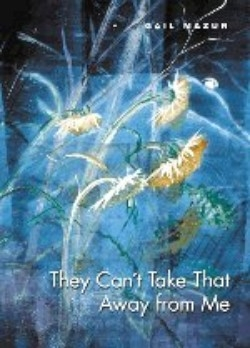They Can't Take That Away from Me (Phoenix Poets Series)
Good poems can be timely or timeless, and sometimes both. Bad poems are rarely either. Confronted with an unknown poem by an unknown poet, the curious reader, once having decided whether he does or does not “like” the poem, may ask (not necessarily consciously): Where does this poem stand in relation to human history? What can I divine, from only the information given me by the poem, about its author, about the society in which it appeared, about the ethical and esthetic values it grew out of?
For a reader encountering any one of the thirty-five poems in this book, certain answers are already apparent. The poet’s work in this obviously contemporary collection is mature, confident, and yet full of a tentative but courageous confrontation with conflict, a quality that pervades almost every poem: hope vs. a jaded acceptance of the not-particularly-promising probabilities; deep anger at the way relationships founder vs. a nagging guilt that maybe she hasn’t tried hard enough; an exalted sense of the beauty of the world and of her own gifts vs. a question on the verge of a gentle cynicism about what it’s really all worth.
The book is divided into five cohesive sections: first, a series questioning her own values and their relevance to the world at large, then an intensely personal series of “domestic” pieces, which include the title poem. These poems are brittle, fearless, and suffused with both the dignity and the stubbornness that can end with: “no no-relieved, selfish, and empty: / wouldn’t I choose if I could not to be human or / any other mammal programmed for cruelty? / No, they can’t take that away from me.” The middle section, probably the most noteworthy, is a grand panorama of family history, personal exploration, and musings on the state of the world, followed by a single raffish persona piece in the voice of Michelangelo working on the Sistine Chapel. The poems in the last section are more carefully modeled, and have a sense of structured calm that seems appropriate to tie together what has been a tumultuous melange of thoughts, emotions, and observations.
This is a fourth book for Gail Mazur, founder and director of the Blacksmith House Poetry Center in Cambridge, Massachusetts, and writer-in-residence at Emerson College. The promise contained in these memorable poems suggests that it won’t be her last.
Reviewed by
Sandy McKinney
Disclosure: This article is not an endorsement, but a review. The publisher of this book provided free copies of the book to have their book reviewed by a professional reviewer. No fee was paid by the publisher for this review. Foreword Reviews only recommends books that we love. Foreword Magazine, Inc. is disclosing this in accordance with the Federal Trade Commission’s 16 CFR, Part 255.

